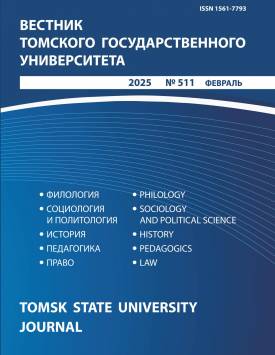Digital educational content in school: Teaching methods model and usage principles
Currently, it is widely recognized that the foundation of the digital transformation of the modern Russian school lies in the active use of a digital educational environment, the basic components of which include verified digital educational content (DEC) for studying academic subjects and tools for teacher-student pedagogical communication based on digital technologies. An example of these components is the Library of DEC of the Federal State Information System (FSIS) "My School" ("Moya Shkola"), developed under the Digital Educational Environment federal project for all subjects and levels of general education, accessible online. This article, based on empirical domestic and international experience, proposes an interpretation of the model of the methodological system of education as a foundation for designing a methodology for using verified DEC (as exemplified by the implementation of the Library of DEC from FSIS "My School", recommended by the Ministry of Education for widespread use since 2021 in Russian schools), taking into account the conditions and features of both the digital transformation of general education and blended (hybrid) learning in Russia. The relevance of developing a methodology for using verified DEC in the context of the digital transformation of modern Russian schools at various levels of general education is driven not only by the large-scale implementation of FSIS "My School" services in practice but also by the demand for such a methodology among the teaching community-teachers and educational professionals at various levels. This is substantiated in the article by the results of research and aggregated empirical data obtained through interviews with teachers and educational professionals and their consultations organized by the Center for Methodological Support for Users of Digital Educational Content at the Federal State Autonomous Educational Institution "State University of Education" (Moscow) as part of its support service activities. This service performs situational, informational, and methodological consultations. It was found that all requests could be conditionally divided into the following five groups, with their respective percentages: (1) presentation of technology for using DEC in lessons, 47%; (2) training in lesson design using DEC (advanced training, educational webinars), 40%; (3) development of informational and reference materials for all participants in the educational process, 5%; (4) creation of a communication platform for sharing teaching practices, 5%; (5) development of regulatory explanations for the use of DEC, 3%. Thus, the majority of requests from subject teachers were somehow related to the need to develop a universal scheme, technology, or algorithm for using educational content from the DEC Library. All these aspects, demanded by educators, according to the authors of this article, are reflected in the proposed model of methodology for using verified DEC and are disclosed through the description of the basic characteristics of the educational process, namely: the goal, content, and components of teacher-student interaction (methods, tools, and forms of teaching). The formal and substantive content of each component is primarily determined by the materials of the FSIS "My School" DEC Library. The authors declare no conflicts of interests.
Keywords
digital transformation of schools, blended (hybrid) learning, digital educational content (DEC), DEC library, Federal State Information System (FSIS) "My School", methodology for using DEC, methodology model, principles of using DECAuthors
| Name | Organization | |
| Ryzhova Natalya I. | Federal State University of Education | nata-rizhova@mail.ru |
| Molokhov Denis A. | Federal State University of Education | denis.web@mail.ru |
| Gosudarev Ilya B. | ITMO University | goss@itmo.ru |
| Karakozov Sergey D. | Moscow Pedagogical State University | sd.karakozov@mpgu.su |
References

Digital educational content in school: Teaching methods model and usage principles | Vestnik Tomskogo gosudarstvennogo universiteta – Tomsk State University Journal. 2025. № 511. DOI: 10.17223/15617793/511/20
